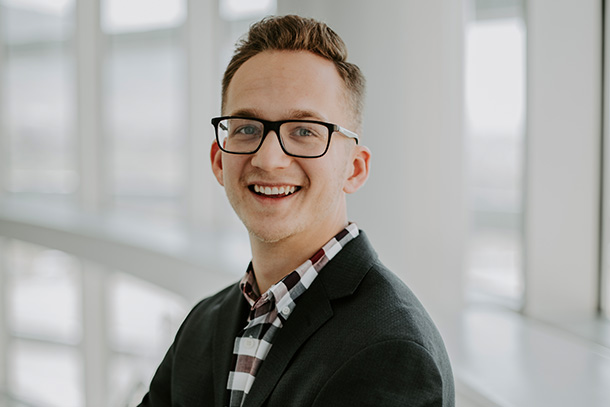
Peter Collins was recently named the recipient of the 2022-23 ACI Presidents’ Fellowship from the ACI Foundation for his research on the use of concrete materials for extraterrestrial infrastructure. Credit: Provided by Peter Collins
Grad student earns fellowship for extraterrestrial concrete research
September 20, 2022
By Sarah Small
UNIVERSITY PARK, Pa. — Peter Collins, doctoral candidate in civil and environmental engineering at Penn State, was recently named the recipient of the 2022-23 ACI Presidents’ Fellowship from the ACI Foundation, a nonprofit subsidiary of the American Concrete Institute. The fellowship is awarded to a student who is enrolled in a graduate program in construction, design, education or materials, according to the ACI Foundation’s website.
“I am very proud of Peter for receiving this recognition, and it is very well deserved,” said Aleksandra Radlińska, Associate Professor of Civil and Environmental Engineering and Collins’ adviser. “Peter has received numerous awards to date due to his superb work ethic and dedication to research. He is outlining a very successful career trajectory and will be making Penn State proud for years to come!”
The ACI Foundation’s mission is to “make strategic investments in ideas, research, and people to create the future of the concrete industry.” The ACI Presidents’ Fellowship will provide Collins with an educational stipend, recognition in Concrete International magazine and on the ACI Foundation website, and paid travel expenses and attendance fees to two ACI conventions.
Collins researches how to further the use of concrete materials for extraterrestrial infrastructure. According to Collins, his early interests concerned the differences in the solidification of cementitious systems on the International Space Station compared to samples solidified on Earth. He is now focused on developing a concrete-like material out of the resources available on the lunar surface.
Collins earned his bachelor’s degree in civil engineering at Utah State University in 2018, where he began his research on concrete materials. In 2020, he was awarded a NASA Space Technology Graduate Research Opportunities Fellowship, which has allowed him to work at NASA’s Marshall Space Flight Center for a couple of months every year to collaborate and dive deeper into his research. Collins has published several peer-reviewed papers, and he worked with Radlińska to establish ACI 565 – Lunar Concrete, a new committee with the American Concrete Institute.
After graduate school, Collins said he would like to use his knowledge of concrete materials to contribute to the field of lunar concrete.
“Civil engineering historically has not been a heavily represented field in terms of human space exploration, but with NASA’s upcoming goals, that is starting to change,” he said. “Ultimately, I want to help progress human society and our understanding of the universe by enabling extended-duration missions through the construction of required infrastructure out of concrete materials.”



